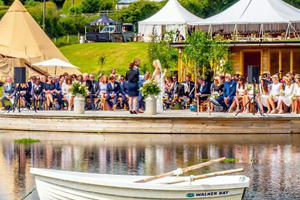Deciding who is going to perform your wedding ceremony is one of the first steps in the planning process, but with a multitude of options, deciding who will help you say I’ do’ is a decision in itself.
Jennifer Constant, founder of The Celebrant Directory a new website listing celebrants across the globe, has created a bride’s guide to answer the most common questions couples, and their families have.
What’s in a name?
Celebrants, Priests, Registrars and Humanists – the choice of who performs your ceremony is a big one, and understanding the similarities, differences and possibilities of each is key to making a decision both of you, and your families are happy with
What’s the difference between a Celebrant and a Priest?
A priest is a member of the clergy, who will have received formal training to perform ceremonies bound by the religious conventions and rites of their faith.
A Celebrant is usually formally trained by the celebrant organisation of the country in which
they are based but can perform the wedding to your specification, pulling in any themes or concepts that you’d like.
What’s the difference between a Celebrant and Registrar?
Registrars are allowed by law to officiate a wedding via civil ceremony, meaning the ceremony is purely secular with no religious tones whatsoever. The registrar is in charge of processing and approving the couple’s marriage license, with the wedding ceremony acting as a formality after the legalities are taken care of.
Celebrants can support and guide couples in completing the necessary requirements for the marriage license, but don’t have the authority to approve it, But, they can officiate a far more bespoke ceremony.
How is a Humanist different to a Celebrant? 
They’re similar in that they are both secular in nature, meaning religion is not their primary concern, however, both can tailor your ceremony to include a religious element if it forms part of your wishes.
The main difference is that Humanists don’t believe in wedding traditions, superstitions and religions, whilst Celebrants don’t advocate any one wedding path over another – their job is to embrace the practices, traditions and religions that are important to you.
Is a Celebrant led wedding legal?
Time to clear up the confusion. As long as you have marriage license and a signed wedding certificate your wedding will be legal and valid – it’s the paperwork that makes it legal, not the ceremony. There’s no rule that the certificate can only be signed after the ceremony, it can be signed beforehand so you’re technically married before the ceremony even begins.
Can I have readings, music, singing in a Celebrant led ceremony?
Yes, it’s your ceremony, you can include anything you like within it. Celebrant led weddings allow you to pick and chose whichever elements or ideas you want to include so its as personal and unique as you.
Jennifer said:
“Whilst many people will have heard of a wedding celebrant not everyone understands exactly what they do, and there are a surprising amount of misconceptions, which its time to clear up. Simply put a celebrant is a person who performs and officiates formal ceremonies, and whilst commonly seen at weddings they can also conduct other services like renewals, baby naming and funeral rites. The beauty of what celebrants offer is the sheer versatility to help couples create tailored, unique ceremonies that reflect their personalities and love for each other.”


Add new comment